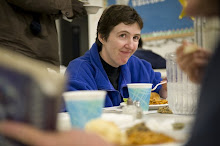Homily, Feast of St. Benedict
Psalm 1 or 34:1-8
Proverbs 2:1-9
Luke 14:27-33
If you seek wisdom like silver, and search for it as for hidden treasures—then you will understand the fear of the Lord and find the knowledge of God.
Today is the Feast of St. Benedict of Nursia, founder of the Benedictine order and generally considered the “father of Western monasticism.” Most of what we know about him comes from the Dialogues of Pope Gregory the Great, written about sixty years after his death. This work appears to be a combination of biographical sketch and miracle stories. What we can receive as factual: Benedict was born around the year 480, in central Italy, of noble birth. He had a sister, by tradition a twin, St. Scholastica. He was educated in Rome, studying rhetoric and law, but was turned off by the excesses of Roman society. He abandoned the life he had been brought up to, taking his childhood nurse with him to a community at the foot of a mountain, maybe 40 miles away. He found a mentor named Romanus, a monk in a nearby monastery, who encouraged him to become a hermit, which he was for three years, embracing prayer, silence, and solitude. Benedict appears to have grown into his vocation during this time, and after he emerged, stories of miracles spread around him, and a community grew up around him. He eventually built twelve monasteries, each with their own abbot, and lived in a thirteenth monastery with a few select brothers, as abbot over all of them. He is noted for the Rule of St. Benedict, which is likely to have been an expansion of an earlier monastic rule, and is the only piece of Benedict’s writing we have. This rule stresses hospitality, humility, prayer, and work, in communal life.
We have, then, a picture of a man who grew up in material wealth, with a good education and all the advantages to succeed in the society of his place and time, who at some point around the age of twenty looked around at all the excesses all around him, and chose an alternative path. Benedict had a vision of what it meant to live in accordance with the Gospel. He did not set out to invent monasticism; it already existed. He added his own focus and energy to reforming what he experienced.
This brings us to the interaction of today’s readings. What are they telling us? First, the Psalm. [quote one line of whichever we use] Seek justice; praise God always. Proverbs centers our hearts in the wisdom of God. Listen, and you shall know how to live; you shall know the reverence and love of the One who created you, and loves you. God’s presence is a treasure which is not hoarded, but is poured out for all of us. If you seek God, you can't help but find God, everywhere.
Are you ready now? Do you know that you are loved? Good, because the Gospel doesn’t mince words. “Take up your cross, and follow me.” As much as we want to talk about love and peace and justice, we cannot get around this. Count the cost. Know exactly what you love, what you seek, and what you’re risking. Then, for the love of the kingdom of God, say yes. There is no other path.
For Benedict, this meant giving up the wealth and privilege that being a son of nobility provided. It meant living in a cave for three years, listening to the voice of God keep him up every night, and then putting up with the antics of twelve housefuls of sometimes harmonious, sometimes cantankerous men. It meant enforcing a rule of life on people who surely didn’t always realize what they’d signed up for, for the sake of creating places in that valley in Italy where God’s love would be the rule of life. For us, it means different things. Student debt, maybe. Perhaps biting your tongue at work; perhaps speaking out when someone is treating someone else unjustly. Perhaps moving across the country for an opportunity that you’re both excited about and frightfully unsure of. Maybe going out for coffee with someone you never thought you’d give the time of day to. All of these mean stepping into the unknown. God is in all of these places.
I can’t tell anyone what to risk or how to choose. We all come from different circumstances. Our lives give us different opportunities. I can ask us all, how do we make our choices? Where are our quiet places? Where is the voice of God, for each of us?




